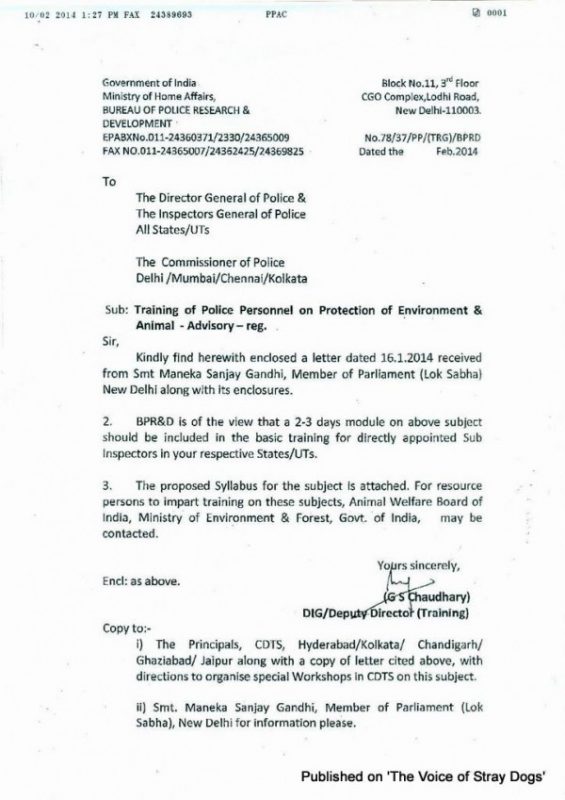For everybody that stands up for animals and Animal Rights, the following two Police Initiatives in February, 2014, have to be taken note of.
In a NUTSHELL:
The Special Commissioner of Police, Law and Order, Delhi Police, has written to all Joint Commissioners of Police, Delhi, and Heads of all Districts, Delhi Police, directing them to ensure that all Officers investigating crimes against animals are familiar with provisions of law relevant for booking crimes against animals and animal protectors, and mention them correctly in FIRs, and investigate offences against animals, and take necessary action against offenders in accordance with law.
The Bureau of Police Research and Development has written to all Commissioners of Police, and Director Generals and Inspector Generals of Police, suggesting that animal protection laws be included in the syllabus of all Police Training Colleges of all states and union territories.
A reading will also reveal to you, how these can help you fight better for the rights of animals, and what you can do.
I
THE SPECIAL COMMISSIONER OF POLICE, LAW AND ORDER, DELHI, has, vide his Directive No. 652-68/SO/Spl.C.P./L&O, dated 7th February, 2014, addressed to all Joint Commissioners of Police, Delhi, and Heads of all Districts, Delhi Police, required them to ensure that it is made the responsibility of all Station House Officers, and A.C.P.s and Sub Divisional Police Officers, to in turn ensure that all I.O.s, i.e. officers investigating crimes against animals are, in the first instance, familiar with the provisions of law relevant for booking crimes against animals and animal protectors. Secondly, that they mention them correctly in FIRs, and investigate offences against animals, and take necessary action against offenders in accordance with law.
Along with the same, he has enclosed the text of some relevant provisions of law, such as Sections 428 and 429 of the Indian Penal Code (i.e. ‘Mischief by killing or maiming animal’, and ‘Mischief by killing or maiming cattle, etc.’), and Section 379 of the Indian Penal Code (i.e., ‘Punishment for theft’), and Section 503 of the Indian Penal Code (i.e. ‘Criminal Intimidation), and other relevant provisions, including sections drawn from the Delhi Police Act (which has an entire chapter titled “Special Powers under the Prevention of Cruelty to Animals Act”, i.e. Chapter IX, containing sections 73 to 79).
(He has also specifically observed that it has been noticed that most police officers are either unaware of these provisions of law, or show apathy when handling cases alleging crimes against animals.)
WHY THIS IS A VERY IMPORTANT DEVELOPMENT:
The police and the courts of law, enforce the law of the land.
The Delhi Police is headed by a Commissioner of Police, who is an IPS Officer of Director General Rank. There are 12 Special Commissioners of Police, 16 Joint Commissioners of Police, 16 Additional Commissioners of Police, 79 Deputy Commissioners of Police/Additional Deputy Commissioners of Police, 243 ACPs, and a very large number of other police officers and police men to assist them in enforcing the law in the NCT of Delhi. ( Their contact coordinates are here )
Needless to state, a Directive issued by the Special Commissioner of Police specifically entrusted with the task of overseeing, and ensuring law and order in and within Delhi, is bound to ‘have the force of law’ among the entire police force.
OFTEN, police officials and police men, when confronted with the text of various sections by complainants such as you or I, do not take them as seriously as they should, when dealing with crimes against animals. HOWEVER, it is highly unlikely that they will take this Directive lightly. This can give a significant boost to efforts to fight crimes against animals.
WHAT YOU CAN AND SHOULD DO:
- If you are at the NCT of Delhi, always keep this handy when lodging a complaint against an animal offender.
- If you feel you are meeting with police apathy, show this to the concerned police person, or together with your complaint that you submit in writing, enclose this as well.
- If you are in any other State or Union Territory, lobby with the senior police authorities of your state or union territory, to get a similar Directive issued to the police force.
A quick summary of the laws/statutes mentioned in the directive are given here:
Sections in The Indian Penal Code, 1860
428. Mischief by killing or maiming animal of the value of ten rupees.- Whoever commits mischief by killing, poisoning, maiming or rendering useless any animals or animal of the value of the ten rupees or upwards, shall be punished with imprisonment of either description for a term which may extend to two years, or with fine, or with both.
429. Mischief by killing or maiming cattle, etc., of any value or any animal of the value of fifty rupees.– Whoever commits mischief by killing, poisoning, maiming or rendering useless, any elephant, camel, horse, mule, buffalo, bull, cow or ox, whatever may be the value thereof, of any other animal of the value of fifty rupees or upwards, shall be punished with imprisonment or either description for a term which may extend to five years, or with fine, or with both.
378. Theft.– Whoever, intending to take dishonestly any movable property out of the possession of any person without that person’ s consent, moves that property in order to such taking, is said to commit theft. Explanation 1.- A thing so long as it is attached to the earth, not being movable property, is not the subject of theft; but it becomes capable of being the subject of theft as soon as it is severed from the earth.
379. Punishment for theft.– Whoever commits theft shall be punished with imprisonment of either description for a term which may extend to three years, or with fine, or with both.
503. Criminal intimidation.– Whoever threatens another with any injury to his person, reputation or property, or to the person or reputation of any one in whom that person is interested, with intent to cause alarm to that person, or to cause that person to do any act which he is not legally bound to do, or to omit to do any act which that person is legally entitled to do, as the means of avoiding the execution of such threat, commits criminal intimidation. Explanation.- A threat to injure the reputation of any deceased person in whom the person threatened is interested, is within this section. Illustration A, for the purpose of inducing B to resist from prosecuting a civil suit, threatens to burn B’ s house. A is guilty of criminal intimidation.
Articles in The Constitution Of India 1949
51A. Fundamental duties It shall be the duty of every citizen of India to
(f) to value and preserve the rich heritage of our composite culture;
(g) to protect and improve the natural environment including forests, lakes, rivers and wild life, and to have compassion for living creatures;48A. Protection and improvement of environment and safeguarding of forests and wild life The State shall endeavour to protect and improve the environment and to safeguard the forests and wild life of the country
This directive came about as a result of the experiences of Ms Shreela Debi in New Delhi. By her own account:
“I was harassed badly and regularly by some residents in my colony for walking dogs on ‘their’ street, the dogs include one ‘pet’ extremely friendly dog and other community dogs who like to walk with us – all totally harmless, sterilised and vaccinated. Soon a couple of men got so vicious that I had to complain to the police for harassment. They were then warned by the police. The verbal harassment stopped, but lurked just below the surface. At this point I sent copies of all the legal provisions that protect stray animals. Including the bit that the Registrations of RWAs can be cancelled if they cross the line. There were frequent skirmishes over my feeding the dogs, I cover a relatively large area, so complaints came from many. The usual complaints were – the dogs stay around there because we feed them. No matter how much I explained that it was exactly the opposite, the unpleasant encounters never stopped. By this time people had started calling up from all over Delhi about how they were being intimidated by neighbors, RWAs and associations. I was out at least a couple of times a week and although I managed to douse the fires, I realized this running around was not possible, nor practical. There was another particularly tragic complaint where a man who offered boarding to dogs managed to make the dogs disappear and then he himself moved to Calcutta. Till date the human parents don’t know what happened. They are devastated. The police laughed when they complained and fobbed them off because they knew nothing about the law.
That’s how the idea of getting a directive from the Police HQ became an important focus. I have been assisting the Delhi Police for a while now concerning women’s issues. There also I work individually and independently. So I decided to try and see if I could involve the Spl CP Law and Order to issue an official order to the effect of what you have seen.”
II
THE BUREAU OF POLICE RESEARCH AND DEVELOPMENT, MINISTRY OF HOME AFFAIRS, GOVERNMENT OF INDIA, has, vide its Circular No. 78/37/PP/(TRG)/BPRD, addressed to the Directors General of Police and the Inspector Generals of Police of ALL states and union territories, and the Commissioners of Police, Delhi, Mumbai, Chennai and Kolkata, on the Subject, “Training of Police Personnel on Protection of Environment & Animal – Advisory – reg.” suggested to them that a 2-3 days module on this subject be included in the basic training for Sub-Inspectors.
The Bureau of Police Research and Development, i.e. BPR&D’s Circular can be seen at the bottom of this page.
Hence, Police Training Colleges of all states and union territories have been advised to include animal protection laws in the training syllabus.
This has been done pursuant to a letter dated 16th January, 2014, received by the BPR&D from Mrs Maneka Sanjay Gandhi, M.P.
WHY THIS IS A VERY IMPORTANT DEVELOPMENT:
This is a very important development because the Bureau of Police Research and Development (BPR&D), was set up specifically in furtherance of the objective of the Government of India for the modernization of police forces. It was set up on 28th August, 1970, and you can read more about it here
It is stated to have evolved as a multifaceted, consultancy organization, and at present has 5 divisions, i.e. the Research & Correctional Administration Division, Modernization / Development Division, Training Division, Administration Division, and National Police Mission Division.
A Circular issued by the BPR&D is bound to be taken very seriously by police authorities across the country.
WHAT YOU CAN AND SHOULD DO:
- Take a print out of this Circular, and visit, or write to the Commissioner of Police, or the Director General or Inspector General of Police of your state or union territory, demanding that it be given effect to.
- Demand, that animal protection laws be included in the training syllabus for police forces. More often than not, they know nothing about these, and our animals bear the brunt of their ignorance. If the police forces are trained properly in this regard, booking and fighting crimes against animals shall become so much easier.

Tags : Bureau of Police Research and Development (BPR&D), Delhi Police, The Voice of STray Dogs, VoSD






